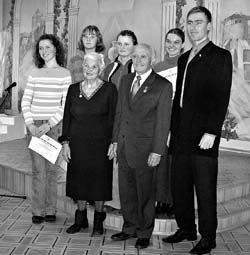Will Ukraine understand Ulas Samchuk?
Apropos of the writer’s birth anniversary
From my Ukrainian literature classes in school I still vividly remember Maria by Ulas Samchuk, The Yellow Prince by Vasyl Barka, and Ivan Bahriany’s The Garden of Gethsemane. It may be difficult for schoolchildren to grasp the depth of human suffering caused by a ruthless government machine (whether Soviet or imperial makes no difference in this case), unjust quirks of destiny, or one’s own naivete. I am convinced, however, that every reader’s blood runs cold from the scenes created by 20th-century Ukrainian writers, who were destined to find themselves far from their native land.
What compelled these people, who seemed to have found a place in the sun in a different social environment, to return time and again to their unfortunate homeland in their writings? After achieving a comfortable way of life, why did their hearts long for home, where they had recently suffered so much injustice?
Participants of the contest “Ulas Samchuk on Ukraine, Ukraine on Ulas Samchuk” are once again seeking to determine the causes of the unbending nature of Ukrainian Diaspora literature. This is the second contest held at Ostroh Academy National University by the International Charitable Foundation for the Rebirth of Ostroh Academy, on the initiative of Oksana and Yaroslav Sokolyk, the sole administrators of Samchuk’s literary estate in Canada.
The literary competition is dedicated to the birth anniversary of the celebrated author of the novels Maria, Volyn, Why Fire Doesn’t Heal, and many other works that are still unknown in his native land after 15 years of independence. Immersed in their daily problems, Ukrainians do not want to remember or learn about Ukrainian memories far beyond the borders of Ukraine.
Nevertheless, Samchuk has been recognized in his country. Two years ago, on the centenary of the writer’s birth a museum was opened in his native village of Derman and a monument unveiled in Rivne. But did Ukraine understand Samchuk? It is highly unlikely that the bureaucrats who spoke during the festivities read a single line from any of his books or understood the message he wanted to convey to his fellow countrymen.
Samchuk is remembered at Ostroh Academy not only during celebrations of his anniversaries. For the students of this university, which has become Volyn’s calling card in Ukraine and far beyond its borders, he is a classic who, while living across the ocean, succeeded in conveying to his readers his fellow countrymen’s moods and their inimitable mentality.
The Sokolyk couple, Samchuk’s descendants, has granted Ostroh Academy’s publishing house exclusive rights to reprint Samchuk’s works in Ukraine. “We are editing the language of Samchuk’s works to make them more understandable to readers in Ukraine. It is no secret that the language of the Diaspora, in which Samchuk wrote for the most part, is not always understandable to us,” says Roman Svynaruk, head of the academy’s editorial and publishing department.
“Two years ago his trilogy Volyn was published to mark the author’s birth centennial. It was edited by Liubov Cherukha, a lecturer at Ostroh Academy. Although only 5,000 copies were published, this is considered quite a sizable print run for Ukrainian literature not meant for the masses. The publisher does not have any copies left. Volyn is really popular with readers. We sent free copies to elementary and high school libraries in Volyn oblast so that students can acquire first-hand knowledge of their fellow countryman’s creative heritage.”
Recently it was learned that the academy’s academic council has decided to reprint Volyn, so book lovers will soon find copies of Samchuk’s most popular trilogy in bookstores.
This year, in conjunction with Samchuk’s birth anniversary, another book consisting of two parts, Astride a White Horse: Recollections and Impressions and Astride a Black Horse: Recollections and Impressions, was prepared for publication and sent to the printers. The book contains the Ukrainian Canadian writer’s recollections of the military occupation of Western Ukraine during World War II, and the intrigues and critical junctures behind the front line. The characters and events are not imaginary but reflect what thousands of people experienced. Here the reader will encounter a number of familiar names, among them Olena Teliha, Yevhen Malaniuk, and Oleh Olzhych. This book will be of interest to historians as well.
Cherukha, the language editor, notes that “above all, the reader will be interested to learn the real facts about the military past of our land, particularly Rivne, Lviv, and Kyiv.” She says that this book is one of the few testimonies to the hard lot of the Ukrainian intelligentsia during the occupation. Soviet literature mostly focused on front-line and partisan activities. For generally known reasons the attempts of the patriotic Ukrainian intelligentsia to preserve both material and moral national values were neglected by Soviet authors. “As these memoirs indicate, Ulas Samchuk tried at all costs to preserve his human and national dignity,” says Cherukha.
Will Ukrainian readers understand his aspirations? This question will be answered after Samchuk’s latest book hits the bookstores.






